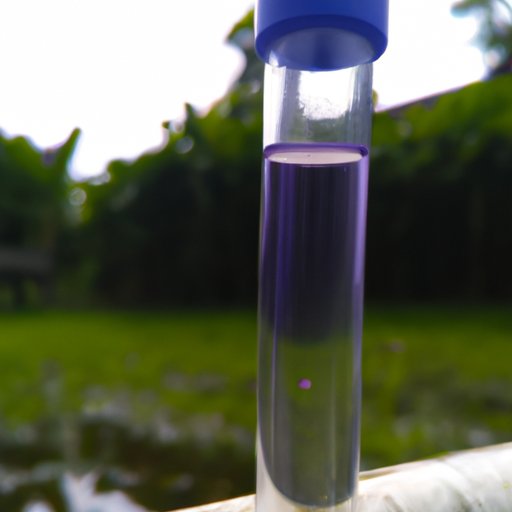Overview of Natural Sciences: Definition, History and Applications
The natural sciences encompass a wide range of disciplines that explore the physical world and its phenomena. From exploring the composition of matter to understanding the laws of motion, the natural sciences are essential for expanding our knowledge of the universe and the world around us.
Definition of Natural Sciences
The National Science Foundation (NSF) defines the natural sciences as “the study of the physical and natural world through observation and experiment.” This includes the study of the laws of nature and the principles that govern the behavior of matter and energy. Examples of natural sciences include physics, chemistry, biology, and earth science.
History of Natural Sciences
The earliest scientific explorations date back to ancient civilizations such as the Egyptians, Greeks and Romans. Natural philosophers of this era laid the foundations for modern scientific thought by developing theories about the natural world. For example, Aristotle proposed that all living things can be classified according to their characteristics, while Archimedes discovered the principle of displacement.
In the 17th century, the scientific revolution began with the development of the scientific method. This period saw the emergence of prominent figures such as Isaac Newton and Galileo Galilei, who made significant contributions to the fields of mathematics and astronomy.
Since then, advances in technology have enabled more detailed and precise studies of the natural world. This has led to major breakthroughs in the fields of medicine, genetics, and climate science, among many others.
Applications of Natural Sciences
The natural sciences have numerous applications in our everyday lives. They provide insight into the structure of the universe and help us understand the world around us. Through experimentation and observation, scientists are able to explain phenomena that were once considered mysterious or even magical.
The natural sciences also play an important role in developing new technologies and medicines. By studying the properties and behavior of matter, scientists have been able to develop new materials with improved properties. Furthermore, the natural sciences have enabled us to unlock the secrets of life, paving the way for the development of treatments for diseases and other medical conditions.
Exploring the Branches of Natural Sciences: Physics, Chemistry, Biology and Earth Science
The natural sciences are divided into four main branches: physics, chemistry, biology and earth science. Each branch focuses on a different aspect of the natural world.
Physics
Physics is the study of matter, energy and their interactions. It seeks to understand the fundamental laws of nature and how they govern the behavior of objects in the universe. Examples of concepts explored in physics include gravity, electricity, magnetism, light and sound.
Chemistry
Chemistry is the study of the composition and properties of matter. It examines the structure of atoms and molecules, as well as the changes that occur when substances react with one another.
Biology
Biology is the study of living organisms and their interactions with the environment. It seeks to understand how living things grow, reproduce and evolve.
Earth Science
Earth science is the study of the Earth and its systems. It encompasses fields such as geology, oceanography, meteorology and astronomy. The goal of earth science is to understand the processes that shape the planet, such as plate tectonics, volcanic activity and climate change.

The Role of Natural Sciences in Our Everyday Lives
The natural sciences play an integral role in our everyday lives. They provide us with a greater understanding of the world around us and help us make informed decisions about our actions and lifestyle choices.
Understanding the World Around Us
The natural sciences help us make sense of the complex and ever-changing world we live in. By studying the laws of nature, we can better understand the causes and effects of various phenomena. This allows us to make more informed decisions about our actions and how they might affect the environment or other living things.
For example, by understanding the principles of evolution, we can develop strategies to protect endangered species and preserve biodiversity. Similarly, by studying the principles of thermodynamics, we can better understand the impacts of climate change and develop solutions to reduce its effects.
Improving Quality of Life
The natural sciences also play an important role in improving our quality of life. By studying the properties of matter, scientists have been able to develop new materials with improved properties. This has enabled us to build more durable and efficient cars, planes and buildings.
The natural sciences have also enabled us to unlock the secrets of life, leading to the development of treatments for diseases and medical conditions. This has drastically improved the longevity and quality of life for many people around the world.
How Natural Sciences are Used to Solve Problems
The natural sciences are often used to identify and solve problems. By studying the laws of nature, scientists can gain insight into the causes and effects of various phenomena. This allows them to develop solutions to address these issues.
Identifying Causes and Effects
The natural sciences can be used to identify the causes and effects of various phenomena. For example, by studying the principles of thermodynamics, scientists can better understand the impacts of climate change and develop strategies to mitigate its effects. Similarly, by studying the principles of evolution, scientists can identify the factors that lead to extinction and develop strategies to protect endangered species.
Developing Solutions
Once the causes and effects of a problem have been identified, scientists can use the natural sciences to develop solutions. This could involve developing new technologies or medicines to address a particular issue. For example, by studying the properties of cells and molecules, scientists have been able to develop treatments for diseases such as cancer and Alzheimer’s.

Exploring the Interconnectedness of Natural Sciences
The natural sciences are interconnected. Different disciplines often overlap and interact with one another in unexpected ways.
Connections Between Different Disciplines
The natural sciences are not isolated from one another. Many concepts and principles overlap between different disciplines. For example, the principles of thermodynamics are relevant to both chemistry and physics. Similarly, the principles of evolution are relevant to both biology and earth science.
Applying Interconnected Knowledge
By understanding the connections between different disciplines, scientists can apply their knowledge in new and innovative ways. For example, by combining their understanding of chemistry and biology, scientists have been able to develop treatments for diseases such as cancer and Alzheimer’s. Similarly, by combining their understanding of physics and earth science, scientists have been able to develop technologies to monitor and predict extreme weather events.
The Impact of Natural Sciences on Human Health
The natural sciences have had a profound impact on human health. While there have been numerous positive impacts, there have also been some negative ones.
Positive Impacts
The natural sciences have enabled us to unlock the secrets of life, leading to the development of treatments for diseases and medical conditions. This has drastically improved the longevity and quality of life for many people around the world.
Furthermore, the natural sciences have enabled us to develop technologies to monitor and predict extreme weather events. This has allowed us to prepare for and respond to natural disasters more effectively, reducing the number of casualties and mitigating the damage caused.
Negative Impacts
However, the natural sciences have also had some negative impacts on human health. The development of new technologies has led to the production of hazardous pollutants, which can cause serious health problems. Additionally, the development of new treatments and technologies has led to an increase in healthcare costs, making health care less accessible to those with limited financial resources.

Examining the Benefits and Challenges of Natural Sciences
The natural sciences offer numerous benefits and come with some challenges.
Advantages of Natural Sciences
The natural sciences are essential for expanding our knowledge of the universe and the world around us. By studying the laws of nature, we can better understand the causes and effects of various phenomena. This allows us to make more informed decisions about our actions and how they might affect the environment or other living things. Furthermore, the natural sciences have enabled us to develop new technologies and medicines, improving our quality of life.
Disadvantages of Natural Sciences
However, the natural sciences also come with some challenges. The development of new technologies and medicines has led to an increase in healthcare costs, making health care less accessible to those with limited financial resources. Additionally, the development of new technologies has led to the production of hazardous pollutants, which can cause serious health problems.
Overcoming Obstacles
To overcome these obstacles, it is important to ensure that the development of new technologies and treatments is done responsibly. This should involve taking measures to reduce the environmental impacts of new technologies and ensuring that new treatments are affordable and accessible to those who need them.
Conclusion
The natural sciences are essential for expanding our knowledge of the universe and the world around us. They provide us with a greater understanding of the world around us and help us make informed decisions about our actions and lifestyle choices. The natural sciences have enabled us to develop new technologies and medicines, drastically improving our quality of life. However, the development of new technologies and treatments has led to some negative impacts on human health. To overcome these obstacles, it is important to ensure that the development of new technologies and treatments is done responsibly.
(Note: Is this article not meeting your expectations? Do you have knowledge or insights to share? Unlock new opportunities and expand your reach by joining our authors team. Click Registration to join us and share your expertise with our readers.)
